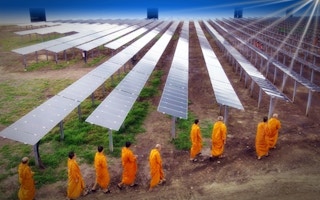As private equity funds worldwide are drying up, there is one area which is still attracting the monies - clean energy in Asia.
Managing director of Singapore-based Conchubar Capital Management, William Byun, noted that in particular, government-driven projects in infrastructure and renewable energy have become attractive options for those looking to park their money in Asia.
“Private equity funds are having difficulties getting finance,” he said. Even those with good track records are facing difficult times with investors holding off since the global financial crisis of 2008 hit market confidence.
What is emerging, however, is that there are still available funds looking to invest in Asia, and they are particularly interested in clean energy or infrastructure projects that have a strong government backing, said Mr Byun, speaking on the sidelines of the Clean Energy Expo held in Singapore this week.
“Clean energy projects that are linked to or driven by government fill investors with confidence, and so they are more likely to invest,” he said. Government-backed projects also have reduced political risk.
In Thailand, for example, the Thai government is giving incentives for foreign investment into renewable energy projects. “Renewable energy is not just a local market solution, it’s also a government solution,” added Mr Byun.
Conchubar, a private equity fund, was launched earlier this year and has already raised US$100 million from European institutional investors such as pension funds and banks.
This fund is meant for industrial policy-linked infrastructure investments. The firm is looking to raise another US$150 million for this fund, and set up a dedicated clean energy fund of US$150 million by next year.
“We are seeing that Asian development has been spearheaded by government-linked infrastructure investments,” said Mr Byun. Government supported projects, such as Jurong Island in Singapore, have been a big driver of that growth. Similarly, investors are looking to similar government-supported projects in clean energy and infrastructure as Asia cities grow bigger.
“It shows that finance is still available if your fund has a dedicated focus,” he said.
Conchubar’s new clean energy fund will explore investment opportunities in government-led renewable energy projects in Asia. Countries such as Thailand, Philippines, and Indonesia present such opportunities in the next few years, he added.
While investors right now are mainly from the West, Mr Byun foresees that as the fund-raising progresses, more Asian-based investors will be involved. “Such investments are long-term and stable, and returns can go up to 20 per cent, which is quite attractive,” he said.
Conchubar’s experience has underscored the key role that governments play to sustain and boost the renewable energy landscape - a topic that was hotly debated at the three-day Clean Energy Expo conference which ended today.
Richard Finlayson, head of the Asia Asset Finance and Leasing Group at Deutsche Bank AG Singapore had noted that “political will is key”, as renewable energy is still not priced competitively with fossil fuels.
The private sector may be wary of financing technology which is relatively new and unfamiliar. Therefore, “a lot of the economics around clean energy rely on government support,” he pointed out, adding that there is a lot more potential for financing from the private sector.
The Asian Development Bank (ADB) has estimated that Asia needs US$10 trillion to finance sustainable energy projects over the next 20 years. It has also called for more support from private investors.
ADB’s Samuel Tumiwa, Principal Planning and Coordination Specialist, Regional & Sustainable Development Department, told Eco-Business that there are many other countries in Asia - apart from China and India - that need financing.
“In Asia, the government has a very important role to play. The right policy and regulations encourage financing,” he said.
First, governments need to make it easy for businesses to invest. “Investors need to see that they can make a profit, maybe 12 to 15 per cent at least. If not, they’re not going to come. Clean energy is good, but is also has to make financial sense,” he added.
Like Mr Byun, Mr Tumiwa also noted that money is trickling in from pension funds in the developed world. The P8 Group, for example, which brings together some of the world’s largest public pension fund, is looking to invest in Asia. ADB is working with the UK government to build a US$2 billion to US$5 billion fund for Asia, he added.
“We need to do what it takes to open the floodgates,” he said.
















